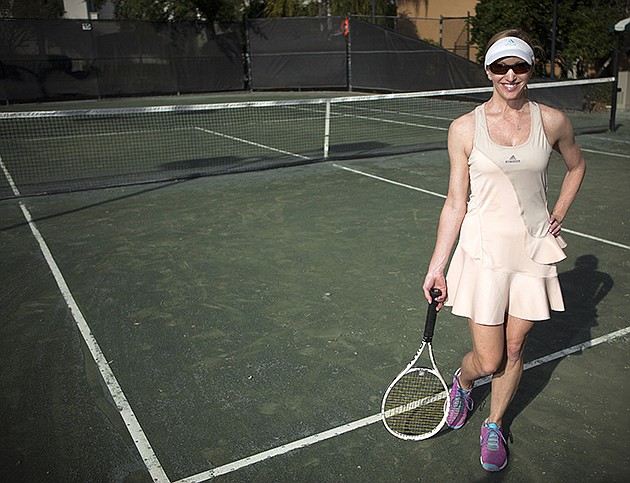- November 24, 2024
-
-
Loading

Loading

Executive: Stephanie Narvades, chief financial officer of Healthesystems, a company that provides medical cost management for the workers' compensation industry. The privately held Tampa-based company with more than 400 employees provides pharmacy and ancillary benefit management and clinical review services, serving more than 1 million injured patients.
Diversion: Tennis, both singles and doubles matches for USTA and Ultimate Tennis. For the league, players are assigned a playing level rating from 1.5 to 7.0, which is based on their competitive record and calculated by the National Tennis Rating Program (NTRP). Over the last four years, 44-year-old Narvades has worked her way up to a 3.5 in the USTA league and a 4.0 in the Ultimate Tennis league. Ultimate Tennis is a flex league that sets up weekly matches against players of comparable ability. For practice, Narvades works out with tennis pro Jose Campos at Harbour Island Athletic Club in Tampa.
Cost of training: In addition to the costs of the athletic club, Narvades pays between $52 to $60 a class at Harbour Island. She also attends clinics on some Mondays and Tuesdays that cost $29 a piece. “The clinics are fun because they are all different levels and guys go to that, so you can play with both men and women,” Narvades says. Narvades likes Campos' workouts because he includes a lot of fitness in his practices, making players practice running for the ball. “It helps me to think on my feet,” she says.
Night match: Narvades hits the tennis court at least four or five times a week, but during the week she always plays at night. “The pros always laugh at me because the club is open until 10, and I'll be there from 8 to 10” at night, she says. It's tough to find a full league of women who want to play at night, Narvades admits.
Blowing Steam: Tennis is a stress reliever for Narvades, who admits that after sitting at a desk all day, getting outside for exercise can be refreshing. “I like the release,” she says. “You get to be physical and you get to hit some balls.” To make sure she works it in her weekly schedule, she treats it like a business appointment — a “commitment” she can't miss. It's easy to do this with tennis, because you always have someone else expecting you to be there, Narvades says.
Learning a skill: The sport is different from other kinds of workouts, Narvades says. Though she's always loved to exercise, including once running the New York Marathon, she says tennis is better. “You're trying to do something, so you don't realize you're exercising,” she says. “You're trying to learn a skill, using your mind.”
Family activity: Narvades started playing tennis four years ago, because her husband and two boys were playing a lot and she was the only one in the family who didn't play. So she signed up for a six-week course that met three times a week and even provided a racket. After her first course, she was hooked and has been in lessons ever since.
Quick to Win: Though she first picked up a racket four years ago, Narvades has quickly made her way to the top of the over 18-year-old women leagues in Tampa. “I'm proud of how far along I've come,” she says. When she was a 3.0, she won first place at Davis Island, and was a finalist in the Ultimate Tennis league when she was a 3.5. In September, Narvades and some girlfriends played in the Mercedes Benz tournament at the Renaissance Vinoy in St. Petersburg. They scored consolation, “but we haven't won the whole thing yet,” Narvades says.
Networking at the net: Narvades says she also meets a variety of people through her league, which is organized online. In fact, she met her doubles partner through the league, a woman who sells yachts, travels frequently and also prefers to play at night.
“If you're social, you like to meet new people and talk to people, tennis would be for you,” Narvades says. “You meet people that can actually help you with your business.”